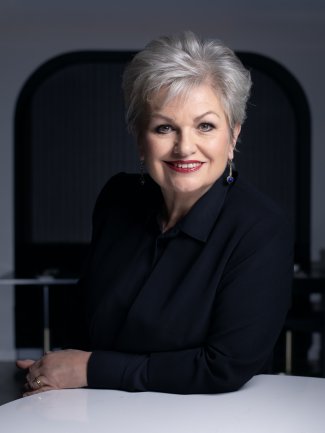




Susan Bullock
“Bullock swept all before her with her memorable Klytemnestra… her musicianship and intelligent stagecraft helped her to dominate even when she wasn’t singing”
Opera Magazine, July 2023
British soprano Susan Bullock is known for her fearless artistry, powerful stage presence, and the emotional depth she brings to her performances. Whether commanding the vast dramatic landscapes of Wagner and Strauss or venturing into new theatrical terrain, she sings with uncompromising honesty and a deep commitment to storytelling.
As her career has evolved, so too has her repertoire. In recent seasons, she has taken on bold new roles, including a “chilling” Kabanicha (Katya Kabanova) at Grange Park Opera, Klytämnestra (Elektra) for both Canadian Opera Company and Oper Frankfurt, and Kostelnička (Jenůfa) for both Den Norske Opera and English National Opera. Her artistic curiosity has also led her to explore roles in contemporary, and crossover, works, such as Mrs. Lovett (Sweeney Todd) for Houston Grand Opera and Scottish Opera, The Mother in Mark Anthony-Turnage’s Greek in Edinburgh, Glasgow and New York, and The Mother in Missy Mazzoli’s Breaking the Waves at the Opera Comique. Most remarkable of all has been her collaboration with Daisy Evans in her re-imagining of Bluebeard’s Castle as an exploration of dementia which has been remounted in Atlanta and Wellington since its premiere in London.
Show more
Last season, she brought her dramatic flair to Scottish Opera as Lady Billows in Albert Herring, joined La Monnaie / De Munt for the world premiere of Mikael Karlsson’s Fanny and Alexander, and portrayed Cosima Wagner in the critically acclaimed UK premiere of Avner Dorman’s Wahnfried for Longborough Festival Opera. Further ahead, she returns to Bluebeard’s Castle in Helsinki; and will sing the role of Iwana, written for her by Missy Mazzoli, in her new opera — The Galloping Cure – for the Edinburgh International Festival and Norrlandsoperan.
A celebrated interpreter of Wagner’s Brünnhilde, Bullock made history as the first soprano to perform four consecutive Ring Cycles at the Royal Opera House under Sir Antonio Pappano, sealing her reputation as one of the leading dramatic voices of her generation. Her portrayal of Strauss’ Elektra, another signature role, has brought her to audiences worldwide, including her debut at The Metropolitan Opera and led to acclaimed collaborations with conductors including Fabio Luisi, Semyon Bychkov, Seiji Ozawa, Sir Mark Elder, and Edo de Waart.
Away from the opera house, Susan Bullock’s voice has been a welcome guest in the world’s foremost concert halls, where she’s performed with such luminaries as Esa-Pekka Salonen and Zubin Mehta, delivering unforgettable interpretations of Erwartung, Wesendonck Leider and the Liebestod from Tristan und Isolde. Further highlights in her long career, included among them the Last Night of the BBC Proms and the London 2012 Olympics Closing Ceremony, have brought opera to wide and varied audiences. In a striking shift from opera to spoken drama, Susan Bullock made her acting debut as Goneril in Keith Warner’s staging of King Lear at the Grange Festival, embracing the challenge of storytelling in a new medium.
Her recording — spanning Salome with Philharmonia Orchestra under Sir Charles Mackerras, Der Ring des Nibelungen with Oper Frankfurt, and latterly, her personal project Songs My Father Taught Me —demonstrate a career marked by both vocal brilliance and personal depth.
Offstage, Susan Bullock is a generous mentor and advocate for the next generation of singers. She contributes actively to the National Opera Studio, sharing her experience through workshops and masterclasses across the UK. Whether through the towering roles of the dramatic soprano canon or her work with young artists, Susan Bullock continues to inspire with her integrity, intelligence, and unmistakable voice.
Contacts
Gallery










“That fine Wagnerian Susan Bullock sang the indomitable Cosima indomitably (and with excellent German diction)”
“Not a word goes astray in this beautifully crafted and endearing anthology.”
“Susan Bullock stood out, stately and imperious as Kabanicha, the mother-in-law from hell who scarcely made eye contact with any member of her family, least of all Katya.”
“Susan Bullock’s Klytämnestra radiated composure and vocal superiority. Her interpretation was not overdrawn, instead she moulded her role with adept restraint, clear declamation and intelligent phrasing.”
“The need to dominate other people, with no thought for its long term effect, was brilliantly brought out by Susan Bullock as a thoroughly unpleasant and immovable Kabinicha”
“Susan Bullock gave a blistering performance as Kátya’s evil mother-in-law Kabanicha, her voice as powerful as her imperious stage presence”
“Susan Bullock is chilling in the clipped phrases of Kabanicha”
“Bullock, great singer-actor that she is, brings us face to face with the horror in the woman’s soul in a performance of unsparing veracity.”
“Susan Bullock is one of the finest British sopranos of our day and a natural creature of the stage, ideal for the Kostelnička. Everything, from her gait to the tightness of her jaw seemed considered and yet entirely organic. Noticeable too was the quality of her diction: with such clarity, not once were surtitles needed. Forceful in the higher register and as sturdy as a coffin in the voice’s lower reaches, this was a tour de force of a performance.”
“Susan Bullock gives a compelling portrayal as the Kostelnička”
“Bullock swept all before her with her memorable Klytemnestra… her musicianship and intelligent stagecraft helped her to dominate even when she wasn’t singing”
“Bullock, 2004’s Elektra, is also a compelling Klytemnestra in her stage presence, as plausible as a husband-slayer as she is as a resolute mother struggling to tame her troubled daughter.”
“The star of the show was Susan Bullock’s Old Lady, a character very much of Bullock’s own creation— the embodiment of satirical humour, with a to-die-for Bronx accent. Bullock vamped it up brilliantly but never excessively: she captured the character’s vulnerability.”
“Finley and Bullock are utterly remarkable here, singing and acting with astonishing emotional nakedness and detailed veracity. Neither has done anything finer. This really is a devastating piece of theatre”
“…stunningly believable and deeply touching performances of Bullock [as Judith] and Finley”
“The star of the show was Susan Bullock’s Old Lady, modelled on Joan Rivers (sensational wig, glamorous wardrobe) but a stage character very much of Bullock’s own creation— the embodiment of satirical humour, with a to-die-for Bronx accent. Bullock vamped it up brilliantly but never excessively: she captured the character’s vulnerability.”
“Susan Bullock’s pitching of Mrs Lovett was spot on, somehow making the pie-cook’s total lack of a moral compass believable: brilliantly adept at the patter, she was comical without tipping into absurdity, not too cockney, not too sentimental and not too irritating.”
“The only three-dimensional figure was Susan Bullock as the Mother [in Breaking the Waves], thanks to her stage presence and powerful rendition of the solo meditation ‘Sons who die at seas’, Bullock showed that this superficially unyielding matriarch had depth and complexity.”
“Susan Bullock [was] magisterial as the benignly stalwart mother.”
“As Mother and Witch, Susan Bullock portrayed with Wagnerian command a woman diminished by poverty and then expanded by cannibalistic lust for gingerbread. She was magnificent in the Witch’s manic cooking preparations”
“Bullock’s drunken, post-coital impersonation of a fireman brought the house down”
“Vocally, her Klytaemnestra is different from the others I’ve heard…She impresses not with power and volume but with nuance and dramatic vulnerability.”
“Susan Bullock and Allison Cook gave virtuoso performances in the chameleon-like soprano roles – both singers blurring the lines between humanity and caricature”
“a pole-axing performance (her first) of the Kostelnička by Susan Bullock…[Bullock’s] steely determination works well for the Kostelnička, and she still has the emotional warmth and innate musicianship to make her a sympathetic character.”
“She is the most thoughtful of musicians and as the tightly coiled Kostelnicka she knows exactly how to turn this to her advantage…she presented a powerful and sympathetic interpretation of this complex character.”
“Susan Bullock has formidable focus and power as the Kostelnicka: her final scene is harrowing.”
“Susan Bullock’s lacerating portrayal of Jenůfa’s stepmother, the Kostelnicka…Bullock, who tears into the Czech consonants with more conviction than anyone else on stage”
“Up at Valhalla, we encounter Susan Bullock’s diminutive, punk-haired Brunnhilde, who exhibits exactly the right passionate energy.”
“Enter Mother, and the wonderful presence of the great Susan Bullock, who doubles as the Witch in Act Three…Bullock is equally convincing in both roles, though the Witch gives her far more scope for her marvellous comic gifts.”
“The double casting of the excellent Susan Bullock as both the children’s mother and the witch emphasises the theme of danger being close to home.“
“Warner’s incredibly detailed response to the text found a willing exponent in Susan Bullock, herself also equally at one with the conductor Roland Böer in stressing the warmth of the music…Bullock, returning to the title role for the first time in six years, was in strong voice, never exaggerating for musico-dramatic effect and consistently delivering a superbly detailed characterization of this tomboyish, neurotically haunted Elektra.”
“With everything onstage amplified to a high-decibel level, the British soprano Susan Bullock wisely deployed her voice, most often heard in heavyweight Wagner and Strauss roles, with buoyant lightness. Thus, no harsh belting or orotund high notes encumbered her wonderfully sprightly Mrs Lovett.”
“[Sweeney Todd] has a stunning counterpart in Susan Bullock’s Mrs. Lovett, who does the best of any performer so far in making her character likable. Sure, she’s always devilishly funny, but Bullock’s tender glances at Sweeney and complete control over vocal nuance bring new perspectives to this odd couple.”
“As Mrs. Lovett, Bullock triumphs with the show’s trickiest role, which beyond its vocal and dramatic demands, also requires a streak of raucous music-hall comedy and mischief. Bullock imbues her textured characterization with some of the exuberant qualities, the earthiness and sass amid the genuine emotional need. Bullock sings with force and flexibility, dispatching devilishly complex lyrics in “The Worst Pies in London” and the delightful “By the Sea,” envisioning domestic bliss with Sweeney.”
“A gripping performance of the Waltraute scene is clinched often by the listener, Brünnhilde. Here Susan Bullock takes us on a little masterclass of attention and support that sums up all that’s best about this show: childish hope-against-hope, anger, tears, defiance and incredulity when sister doesn’t buy into her new love.”
“She acts up a storm…with the voice solidly produced, a real trill, her enunciation perfect. When she sings ‘Siegfried, see my anguish’, right before her final monologue, Siegfried listens, transformed…she inhabits the role and the high notes ring out as well.”
























